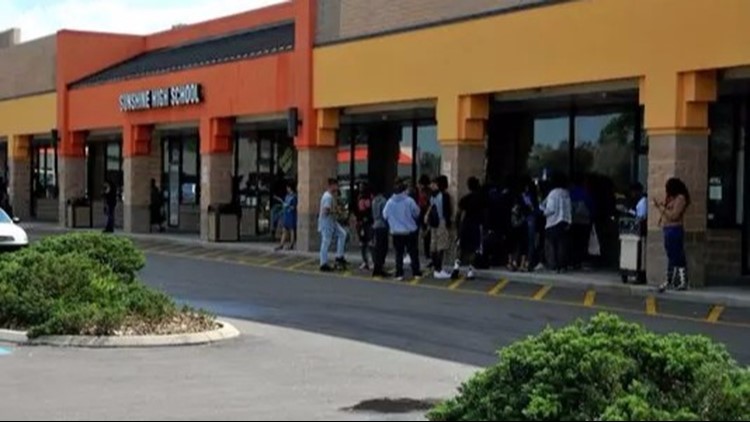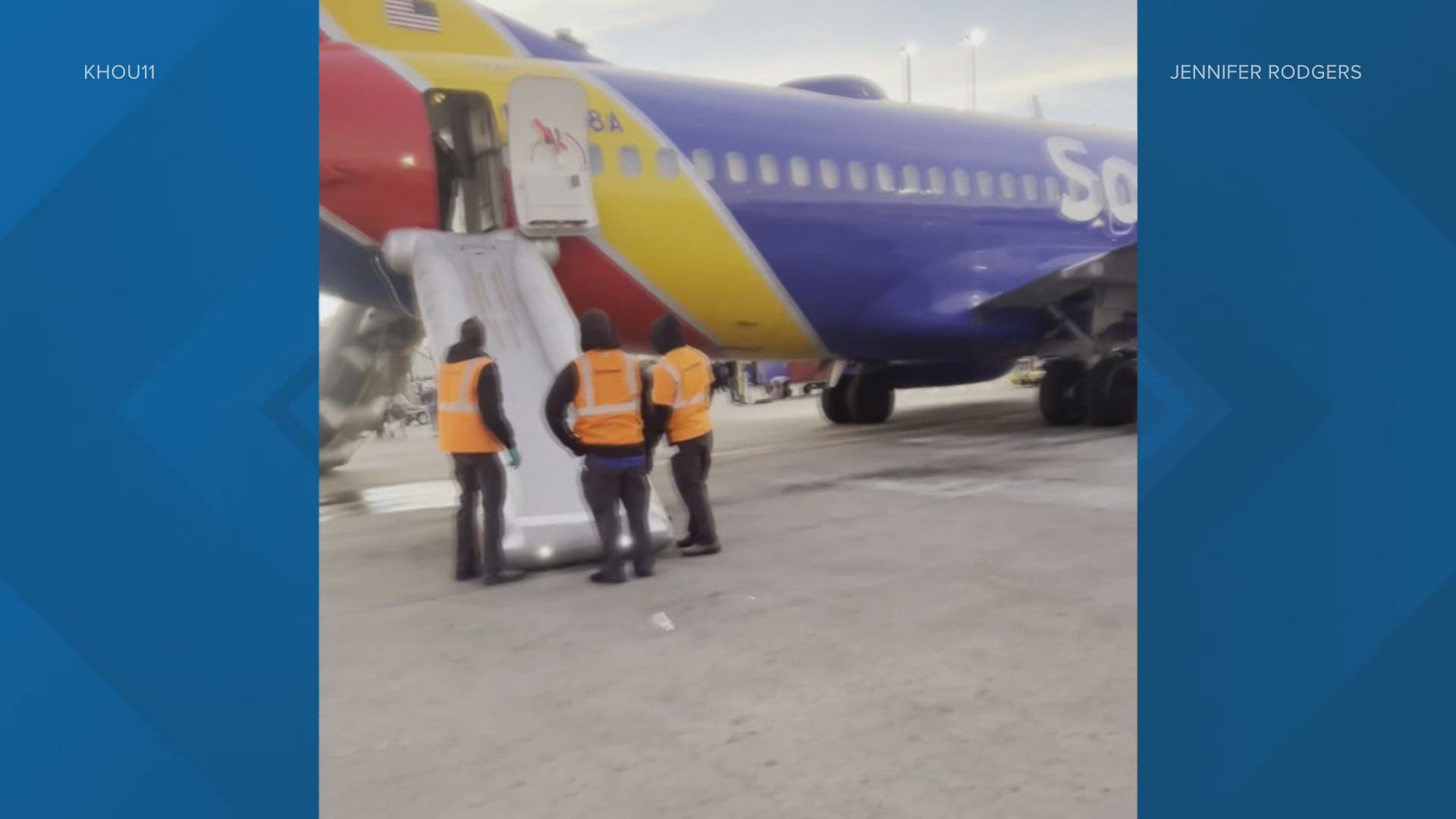Tucked among posh gated communities and meticulously landscaped shopping centers, Olympia High School in Orlando offers more than two dozen Advanced Placement courses, even more afterschool clubs, and an array of sports from bowling to water polo. U.S. News and World Report ranked it among the nation’s top 1,000 high schools last year. Big letters painted in brown on one campus building urge its more than 3,000 students to “Finish Strong.”
Olympia’s success in recent years, however, has been linked to another, quite different school 5 miles away. Last school year, 137 students assigned to Olympia instead attended Sunshine High, a charter alternative school run by a for-profit company. Sunshine stands a few doors down from a tobacco shop and a liquor store in a strip mall. It offers no sports teams and few extra-curricular activities.
Sunshine’s 455 students – more than 85 percent of whom are black or Hispanic – sit for four hours a day in front of computers with little or no live teaching. One former student said he was left to himself to goof off or cheat on tests by looking up answers on the internet. A current student said he was robbed near the strip mall’s parking lot, twice.
Sunshine takes in cast-offs from Olympia and other Orlando high schools in a mutually beneficial arrangement. Olympia keeps its graduation rate above 90 percent — and its rating an “A” under Florida’s all-important grading system for schools — partly by shipping its worst achievers to Sunshine. Sunshine collects enough school district money to cover costs and pay its management firm, Accelerated Learning Solutions (ALS), a more than $1.5 million-a-year “management fee,” 2015 financial records show – more than what the school spends on instruction.
But students lose out, a ProPublica investigation found. Once enrolled at Sunshine, hundreds of them exit quickly with no degree and limited prospects. The departures expose a practice in which officials in the nation’s tenth largest school district have for years quietly funneled thousands of disadvantaged students – some say against their wishes – into alternative charter schools that allow them to disappear without counting as dropouts.
“I would show up, I would sit down and listen to music the whole time. I didn’t really make any progress the whole time I was there,” said Thiago Mello, 20, who spent a year at Sunshine and left without graduating. He had transferred there from another alternative charter school, where he enrolled after his grades slipped at Olympia.
The Orlando schools illustrate a national pattern. Alternative schools have long served as placements for students who violated disciplinary codes. But since the No Child Left Behind Act of 2001 refashioned the yardstick for judging schools, alternative education has taken on another role: A silent release valve for high schools like Olympia that are straining under the pressure of accountability reform.
As a result, alternative schools at times become warehouses where regular schools stow poor performers to avoid being held accountable. Traditional high schools in many states are free to use alternative programs to rid themselves of weak students whose test scores, truancy and risk of dropping out threaten their standing, a ProPublica survey of state policies found.
Orlando is one of 83 school districts, from Newark to Los Angeles, where regular schools increased their graduation rates by at least one percentage point from 2010 to 2014 while sending more students into alternative education, ProPublica’s analysis found. Such a pattern could indicate that traditional schools are weeding out students at greater risk of dropping out, although there are many reasons why graduation rates rise.
Concerns that schools artificially boosted test scores by dumping low achievers into alternative programs have surfaced in connection with ongoing litigation in Louisiana and Pennsylvania, and echo findings from a legislative report a decade ago in California. The phenomenon is borne out by national data: While the number of students in alternative schools grew moderately over the past 15 years, upticks occurred as new national mandates kicked in on standardized testing and graduation rates.
The role of charter alternative schools like Sunshine – publicly funded but managed by for-profit companies – is likely to grow under the new U.S. Secretary of Education, Betsy DeVos, an ardent supporter of school choice. In her home state of Michigan, charter schools have been responsible in part for a steep rise in the alternative school population. She recently portrayed Florida as a national model for charters and choice.
In Orlando, both traditional and alternative charter schools manipulate the accountability system. The charters exploit a loophole in state regulations: By coding hundreds of students who leave as withdrawing to enter adult education, such as GED classes, Sunshine claims virtually no dropouts. State rules don’t label withdrawals for that reason as dropping out. But ALS officials cannot say where Sunshine students actually went – or if they even took GED classes at all.
Between the day in 2012 when it first opened, and the end of the 2015 school year, Sunshine High coded 1,230 withdrawals as students leaving for adult education. At least nine of the company’s other charter schools statewide – including three in Orange County - followed a similar pattern. Not counting Sunshine, the other ALS schools in Florida reported 5,260 more such withdrawals.
ALS ran seven of the 10 high schools statewide with the most withdrawals to adult education in 2015. Sunshine ranked first. If all such withdrawals from ALS schools in Florida were counted as dropouts, the number of times that students quit school statewide that year would increase by at least 5 percent. In Orange County, the number of dropouts would jump by at least 80 percent.
The apparent suppression of the dropout rate occurred as Orlando’s district, Orange County Public Schools, geared up to win a major national education award.
In a written statement, district officials disputed that the transfers helped elevate the school system’s standing under state accountability rules. Students who quit to pursue adult education do count against the district’s overall graduation rate, even though they aren’t labeled as dropouts, they said. They did not respond to questions about whether transfers to Sunshine and other alternative charters have inflated the graduation rates of traditional schools like Olympia.
“Any national or state recognition the district has received,” the statement said, “is the direct result of our parents, students, teachers, and school administrators working hard.”
ALS President Angela Whitford-Narine said the company is continually improving at the challenging task of helping students who have struggled academically attain enough credits to graduate. The average student in ALS schools is at least two years behind, she said.
“I can’t even begin to say we have this all figured out,” she while giving ProPublica a tour of Aloma High, another charter school the company runs in Orange County. “But every day we get better at it.”
Sunshine and schools like it promise students they can graduate more quickly by going at their own pace. But Mello said students end up at Sunshine because they had trouble getting their work done.
“You go in there with bad habits and you’re already going ‘at your own pace,’” said Mello, who graduated from a regular high school in Texas and now works as a mechanic in a suburb of Dallas. “It doesn’t work like it’s intended to work.”



